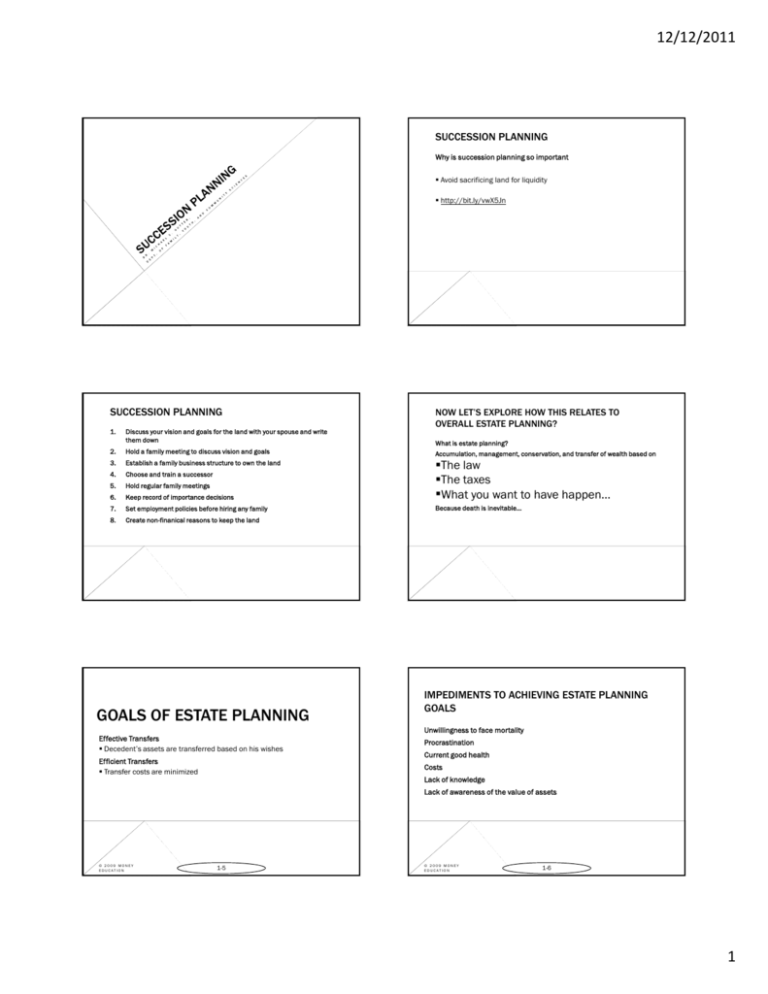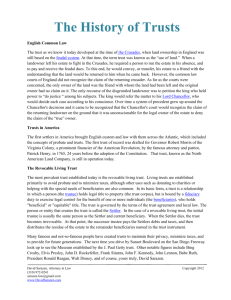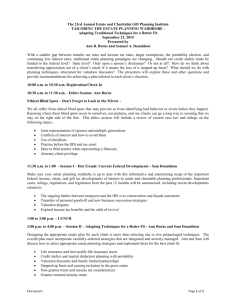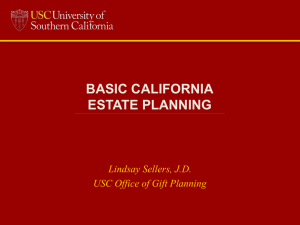GOALS OF ESTATE PLANNING
advertisement

12/12/2011 SUCCESSION PLANNING Why is succession planning so important Avoid sacrificing land for liquidity http://bit.ly/vwX5Jn SUCCESSION PLANNING NOW LET’S EXPLORE HOW THIS RELATES TO OVERALL ESTATE PLANNING? 1. Discuss your vision and goals for the land with your spouse and write them down 2. Hold a family meeting to discuss vision and goals Accumulation, management, conservation, and transfer of wealth based on 3. Establish a family business structure to own the land 4. Choose and train a successor 5. Hold regular family meetings What is estate planning? 6 6. Keep record of importance decisions The law The taxes What What you want to have happen… happen 7. Set employment policies before hiring any family Because death is inevitable… 8. Create non-finanical reasons to keep the land GOALS OF ESTATE PLANNING Effective Transfers Decedent’s assets are transferred based on his wishes Efficient Transfers Transfer costs are minimized IMPEDIMENTS TO ACHIEVING ESTATE PLANNING GOALS Unwillingness to face mortality Procrastination Current good health Costs Lack of knowledge Lack of awareness of the value of assets © 2009 MONEY EDUCATION 1-5 © 2009 MONEY EDUCATION 1-6 1 12/12/2011 CONSEQUENCES FOR FAILING TO PLAN: SAME AS WHAT WE JUST SAW IN THE VIDEO Client’s property transfer objectives may go unfulfilled Transfer taxes may be excessive Other transfer costs may be excessive Client’s family may not be properly provided for financially Th There may be b insufficient i ffi i liquidity li idi to cover client’s li ’ d debts, b taxes, and d costs at death © 2009 MONEY EDUCATION THE FINANCIAL PLANNER’S ESTATE PLANNING PROCESS 8 Six basic steps: 1. Establish the client/planner relationship. 2. Gather client information, including the client’s current financial statements and establish the client’s transfer objectives, including family and charitable objectives. 3. Determine the client’s financial status. 4. Develop a comprehensive plan of transfers consistent with all information and objectives. 5. Implement the estate plan. 6. Review the estate plan periodically and update the plan when necessary (especially for changes in family situations). CHAPTER 13 1-7 BASIC DOCUMENTS IN AN ESTATE PLAN ESTATE SETTLEMENT PROCESS Wills 1. Initial responsibilities (funeral, etc.) Side Letters of Instruction 2. Probating Will Powers of Attorney for Property 3. Appointment of executor or administrator Durable Powers of Attorney for Health Care 4. Assembling estate property Li i Wills Living Will or Ad Advance M Medical di l Di Directives i 5 Managing estate 5. Do Not Resuscitate Orders (DNRs) 6. Payment of debts and taxes 7. Distributing estate ©2009 MONEY EDUCATION 2-9 TRANSFER BY CONTRACT Life insurance Distribution of proceeds dictated by contract Will would have no effect unless no beneficiary named on contract Same is true for retirement accounts Antenuptial or prenuptial agreements May substitute for spouse’s rights at death TRANSFER BY OPERATION OF LAW Intestate succession If no will it is determined by state of residence JTWROS Family allowance Small amount set aside to support family during estate administration Not part of distributable estate Homestead Keeps a certain item of real property away from creditors 2 12/12/2011 TRANSFERS BY WILL Personal declaration of one’s intentions about the disposition property at death Allows one to name an executor of choice Take advantage of marital deduction Spousal rights:Typically a spouse could challenge will if the amount of bequest is less than state law would dictate under intestacy laws Direct source of property to pay estate taxes Designate guardian for minor children Requires: signature, date, witnesses, mental competence, age of majority (for state) ADVANTAGES OF A PROPERLY PREPARED AND VALID WILL (1 OF 2) Permits the selection of an executor/executrix as the decedent’s personal representative to administer the estate Provides for the orderly transfer of assets that are not automatically transferred at death by some other means Permits the designation of guardian for minors and or dependents Permits the transfer of assets to charity (is not possible in intestacy) ©2009 MONEY EDUCATION ADVANTAGES OF A PROPERLY PREPARED AND VALID WILL (2 OF 2) A will can provide for the utilization of the unlimited marital deduction A will can provide for disinheritance of unworthy heirs A will can help to minimize the estate tax burden A will can direct the estate’s share of any tax burden to be paid as well as sources of funds to be used to pay such taxes ©2009 MONEY EDUCATION 2-15 LEGAL CAPACITY TO EXECUTE A WILL Mental Capacity to Make a Will is “Sound Mind” The party making the will must: Understand what is being done by writing of will Recognize and recollect the property being disposed by the will Recognize the relationships of those friends and relatives who have y claim to testator’s assets any “Sound Mind” Rules The legal capacity is not as rigorous as capacity rules required to form legal contracts ©2009 MONEY EDUCATION 2-17 2-14 LIMITATIONS OF WILLS A will does not prevent disinherited parties from contesting the will Courts can invalidate certain restrictions or sections of a will (too many constraints on transfer of assets)) A will does not supercede automatic transfers upon testator’s death (i.e., contractual arrangements) A poorly drafted will may be found to be invalid or testator’s wishes may not be clearly understood ©2009 MONEY EDUCATION 2-16 COMMON CLAUSES (PROVISIONS) IN WILLS (2 OF 3) Clause for identification and selection of executor/executrix (and successors) Guardianship Clause Names the guardian for minors or other legal dependents Appointments and Powers Clause Clause directing payment of debts and taxes (includes the sources from which to pay them) Attestation Clause A provision at end of the document signed by the witnesses as authentication of testator’s will ©2009 MONEY EDUCATION 2-18 3 12/12/2011 UNDOING A WILL… Revoking a Will To revoke a will the testator can: Simply destroy the old will by shredding or burning it Create a new will specifically revoking the old one Codicil A supplement to a will A separate document that must meet all the legal requirements of a will Modifies, explains, or amends will The testator must be competent each time a codicil is written Frequently used due to a change in family circumstances (birth of child) and is less expensive than drafting an entire new will ©2009 MONEY EDUCATION Divorce Statutes Invalidates a provision in a will that leaves assets to a former spouse Anti Lapse Statutes Anti-Lapse Presumption that if a close relative such as a child or sibling is not alive then the testator would have wanted the assets to flow to their heirs ©2009 MONEY EDUCATION 2-19 ADVANTAGES OF PROBATE Validation of the decedent’s will Executor activities supervised by court Time frame established for creditor creditor’ss claims Provides forum for resolving estate issues PROBATE VS. NON-PROBATE ASSETS Fee simple property TiC property Community Property Invalid Beneficiary Designations STATUTES AFFECTING WILLS (2 OF 2) State-contract law Life insurance Annuities Retirement accounts Pay on Death /Transfer on Death accounts 2-20 DISADVANTAGES OF PROBATE Lack of privacy because will becomes a matter of public record Time consuming Court costs result from the administration process Executor commissions and attorney fees are generated from probate property PROBATE AVOIDANCE METHODS Titling property in joint tenancy with right of survivorship or tenancy by the entirety Property passing by contract (such as life insurance, IRAs, pension plan benefits, etc. passes outside off probate) Totten Trusts & Payable on Death Accounts are nonprobate Transferring property by deed Living Trusts hold nonprobate property 4 12/12/2011 INTESTACY RISKS TO DYING INTESTATE What is it? Intestacy is a legal distribution scheme provided by the state legislature for a decedent who dies without a valid or complete will. Dying without a valid will, or Dying with a will that does not dispose of all of the decedent’s probate p p property. p y A surviving spouse may receive the same share of the decedent’s probate estate as a child 1 child vs. 10 children A spouse may share assets with in-laws The decedent’s children are usually treated equally in intestacy, which may not be equitable The Probate Court will appoint an administrator and require a surety bond making the cost of probate increase The decedent with a valid will can appoint an executor to serve (and without bond) A decedent who has a valid will is said to die “testate.” ©2009 MONEY EDUCATION POWER OF ATTORNEY AND APPOINTMENT (1 OF 3) Legal document authorizing a trusted person (agent) to act on one’s (principal) behalf General Power of Appointment (very broad) •Causes inclusion in gross estate Limited Power of Attorney (more specific) Does not survive the death of the principal except general power of appointment (usually given to spouse) A power of attorney permits an agent to act, a power of appointment permits the agent to appoint assets ©2009 MONEY EDUCATION 2-27 POWER OF ATTORNEY AND APPOINTMENT (3 OF 3) Durability Feature Power remains in effect even if the principal becomes incapacitated or disabled Springing Power A power that “springs” springs into existence upon some defined event or determination (e.g., the principal is unconscious or leaves the country) 2-25 ©2009 MONEY EDUCATION 2-26 POWER OF ATTORNEY AND APPOINTMENT (2 OF 3) Power of Attorney Power of Appointment A stand-alone document that allows an agent to act for the principal and may include the power to appoint i t assets t Power to act Ends at the death of the principal May be general or limited May be revoked at anytime by the principal A power, usually included in a trust or power of attorney, allowing the power holder to direct assets t tto another th Power to transfer assets May survive the death of the grantor May be general or limited May be revoked at anytime by the principal ©2009 MONEY EDUCATION 28 POWER OF ATTORNEY FOR PROPERTY Specific type of power of attorney May be durable or not and springing or not Used to allow an agent to manage the principal’s property Example of a Power of Attorney Exhibit 2.9, page 40 ©2009 MONEY EDUCATION 2-29 ©2009 MONEY EDUCATION 2-30 5 12/12/2011 PROS/CONS OF POWER OF ATTORNEYS Advantages Eliminates need to go to court to appoint a guardian of the estate Allows agent to sell or manage property if needed Disadvantages Agent may abuse the power If agent holds a general power of appointment, then the assets will be included in the agent’s gross estate if the agent predeceases the principal p p p ©2009 MONEY EDUCATION 2-31 INTRODUCTION Trusts are used for: The management of assets Flexibility in the operation of the estate plan (except charitable trusts) © 2 0 0 9 M O N E Y E D U C AT I O N 832 1 12/12/2011 DEFINITIONS WHY USE A TRUST? (2 OF 3) Legal Title – title held by the trustee Split interests in property Valuable asset that grantor does not want to sell or split up (e.g., gifting farm to 5 kids where only 2 will participate) Beneficial Title – title held by the beneficiaries Grantor – the G h person who h creates and d initially i i i ll ffunds d the h trust © 2 0 0 9 M O N E Y E D U C AT I O N 833 © 2 0 0 9 M O N E Y E D U C AT I O N 836 WHY USE A TRUST? (3 OF 3) PARTIES Grantor (a.k.a. settlor, creator, trustor) Person who creates and initially funds the trust Trusts Avoid Probate (Living Trust) Revocable living trust – managed by the grantor and is for the benefit of the grantor during lifetime Becomes irrevocable at death Does oes not ot avoid a o d estate taxes ta es Trustee Manages the trust and carries out the provisions in the trust document Must act in the best interest of all beneficiaries •Duty of loyalty and care Trusts Avoid Taxes Beneficiary Transfer future appreciation Avoid transfer tax on subsequent generations Reduce gross estate Income – has the right to income Remainder – has the right to property when trust terminates © 2 0 0 9 M O N E Y E D U C AT I O N 8-4 © 2 0 0 9 M O N E Y E D U C AT I O N Management of Assets TRUST DURATION – THE RULE AGAINST PERPETUITIES Creditor Protection All interests in a trust must vest within lives in being plus 21 years WHY USE A TRUST? (1 OF 3) Assist those not capable of managing assets Spendthrift Clause •States beneficiary cannot assign, pledge or promise to give the assets of the trust to anyone, and if a promise is made, it is void. 837 Some states have adopted a statutory rule against perpetuities (90 years) Also should allow the trustee to make distributions on a discretionary basis Most states do not allow the grantor to create a spendthrift trust for protecting his assets IRS recognizes both rules Some states have abolished the rule against perpetuities but include laws that prohibit the trustee from selling property © 2 0 0 9 M O N E Y E D U C AT I O N 835 © 2 0 0 9 M O N E Y E D U C AT I O N 8-8 1 12/12/2011 TAXATION OF TRUST (1 OF 2) Estate Settlement Process Income Tax – Hybrid Entities Distributed – Taxed to beneficiaries Accumulated – Taxed at trust rates •See Exhibit 8.1, page 263 1. 2. 3. 4. 5. 6. 7. Simple Trust – mandates distribution of income Complex Trusts – permits accumulation of income © 2 0 0 9 M O N E Y E D U C AT I O N Initial responsibilities (funeral, etc.) Probating Will Appointment of executor or administrator Assembling estate property Managing estate Payment of debts and taxes Distributing estate 839 PROBATE AVOIDANCE METHODS TAXATION OF TRUST (2 OF 2) Titling property in joint tenancy with right of survivorship or tenancy by the entirety If the trust is revocable – not a completed gift Property passing by contract (such as life insurance, IRAs, pension plan benefits, etc. passes outside of probate) If the trust is irrevocable – generally completed (unless retained interests) Totten Trusts & Payable on Death Accounts are nonprobate See Exhibit 8.2 (page 270) on tax issues related to trusts Transferring property by deed Living Trusts hold nonprobate property © 2 0 0 9 M O N E Y E D U C AT I O N 840 Gross Estate Adjusted Gross Estate Taxable Estate Tentative Tax Base Tentative Tax 2 12/12/2011 INTRODUCTION TO DYNASTY TRUSTS (1 OF 4) Adjusted Gross Estate Less Charitable Deduction – discussed in When properly drafted, a dynasty trust will not vest ownership of trust property in any individual beneficiary Equals Taxable Estate The Rule Against g Perpetuities p Less Marital Deduction – discussed in Chapter Delaware, Alaska, and South Dakota are the states where most individuals create dynasty trusts Plus Post ‘76 Gifts – added back to gross up (total transfers) Equals Tentative Tax Base Taxation of Dynasty Trusts A dynasty trust pays tax on its income to the extent that the income is not distributed to the beneficiaries © 2 0 0 9 M O N E Y E D U C AT I O N 6-45 1348 ©2009 Money Education DEDUCTIONS FROM ADJUSTED GROSS ESTATE INTRODUCTION TO DYNASTY TRUSTS (2 OF 4) Marital Deduction Unlimited Tax-Free Property included in decedent’s gross estate passes to spouse p Actuallyy p Charitable Deduction Qualified charities only 100% deductible Simple Basic Structure and Types of Dynasty Trusts Grantor funds the trust with personal property Trust document usually designates the state g whose laws will govern Usually wise to name two independent trustees Typically name two or more “ Trust Protectors ” who are individuals that are not beneficiaries of the trust with the authority to remove the trustee Grantor should never serve as trustee or trust protector of a dynasty © 2 0 0 9 M O N E Y E D U C AT I O N CURRENT STATUS OF FEDERAL ESTATE TAX LAW Year Applicable Credit Max Rate 2011 $5,000,000 35% 2012 $ $5,000,000 35% 2013 $1,000,000 55% IN NEGOTIATION BY CONGRESS… 1349 INTRODUCTION TO DYNASTY TRUSTS (3 OF 4) Basic Structure and Types of Dynasty Trusts The trust instrument often gives the trustee the authority to terminate the trust in whole or in part if it is appropriate to do so Trustee is typically empowered to purchase assets for the beneficiary’s personal use © 2 0 0 9 M O N E Y E D U C AT I O N 1350 3 12/12/2011 INTRODUCTION TO DYNASTY TRUSTS (4 OF 4) Dynasty trusts succession planning and business A dynasty trust can be used to acquire and hold closely held or family business stock A dynasty trust provides creditor protection, avoidance of transfer taxation at each generational level on the value of the business, as well as protection from the claims of a divorcing spouse Funding the trust Usually cash or personal property Should avoid real property because of antialienation provisions enacted by states © 2 0 0 9 M O N E Y E D U C AT I O N 1351 GENERAL DRAFTING ISSUES FOR DYNASTY TRUSTS Power of appointment – usually available Termination – usually ends when last descendent dies May have trust committee giving them the ability to terminate Trustee – broad investment powers Spendthrift clause appropriate © 2 0 0 9 M O N E Y E D U C AT I O N 1352 4







